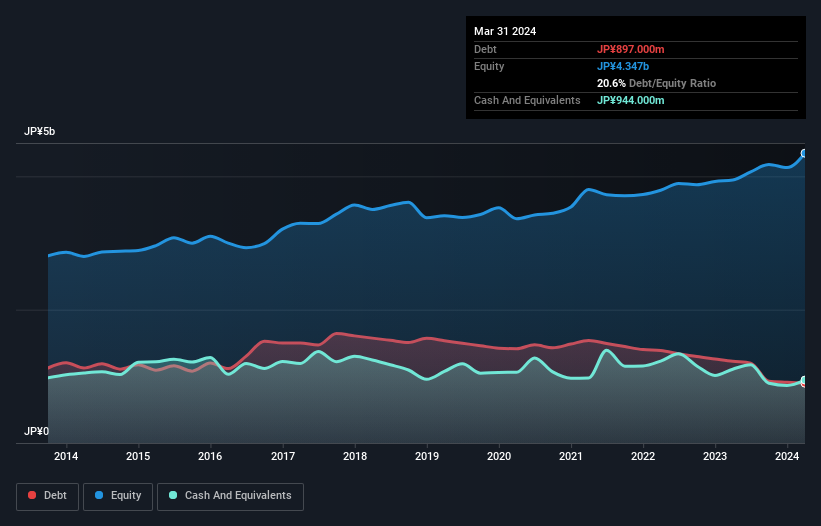
Legendary fund manager Li Lu (who Charlie Munger backed) once said, 'The biggest investment risk is not the volatility of prices, but whether you will suffer a permanent loss of capital.' So it might be obvious that you need to consider debt, when you think about how risky any given stock is, because too much debt can sink a company. We note that Kyogoku unyu shoji Co., Ltd. (TSE:9073) does have debt on its balance sheet. But is this debt a concern to shareholders?
When Is Debt Dangerous?
Debt assists a business until the business has trouble paying it off, either with new capital or with free cash flow. Ultimately, if the company can't fulfill its legal obligations to repay debt, shareholders could walk away with nothing. While that is not too common, we often do see indebted companies permanently diluting shareholders because lenders force them to raise capital at a distressed price. By replacing dilution, though, debt can be an extremely good tool for businesses that need capital to invest in growth at high rates of return. The first step when considering a company's debt levels is to consider its cash and debt together.
View our latest analysis for Kyogoku unyu shoji
What Is Kyogoku unyu shoji's Debt?
You can click the graphic below for the historical numbers, but it shows that Kyogoku unyu shoji had JP¥897.0m of debt in March 2024, down from JP¥1.23b, one year before. But it also has JP¥944.0m in cash to offset that, meaning it has JP¥47.0m net cash.

How Healthy Is Kyogoku unyu shoji's Balance Sheet?
We can see from the most recent balance sheet that Kyogoku unyu shoji had liabilities of JP¥2.33b falling due within a year, and liabilities of JP¥1.39b due beyond that. On the other hand, it had cash of JP¥944.0m and JP¥1.43b worth of receivables due within a year. So its liabilities total JP¥1.35b more than the combination of its cash and short-term receivables.
While this might seem like a lot, it is not so bad since Kyogoku unyu shoji has a market capitalization of JP¥2.44b, and so it could probably strengthen its balance sheet by raising capital if it needed to. But it's clear that we should definitely closely examine whether it can manage its debt without dilution. Despite its noteworthy liabilities, Kyogoku unyu shoji boasts net cash, so it's fair to say it does not have a heavy debt load!
Better yet, Kyogoku unyu shoji grew its EBIT by 450% last year, which is an impressive improvement. If maintained that growth will make the debt even more manageable in the years ahead. The balance sheet is clearly the area to focus on when you are analysing debt. But you can't view debt in total isolation; since Kyogoku unyu shoji will need earnings to service that debt. So when considering debt, it's definitely worth looking at the earnings trend. Click here for an interactive snapshot.
But our final consideration is also important, because a company cannot pay debt with paper profits; it needs cold hard cash. Kyogoku unyu shoji may have net cash on the balance sheet, but it is still interesting to look at how well the business converts its earnings before interest and tax (EBIT) to free cash flow, because that will influence both its need for, and its capacity to manage debt. Happily for any shareholders, Kyogoku unyu shoji actually produced more free cash flow than EBIT over the last three years. That sort of strong cash conversion gets us as excited as the crowd when the beat drops at a Daft Punk concert.
Summing Up
While Kyogoku unyu shoji does have more liabilities than liquid assets, it also has net cash of JP¥47.0m. The cherry on top was that in converted 489% of that EBIT to free cash flow, bringing in JP¥329m. So we don't think Kyogoku unyu shoji's use of debt is risky. When analysing debt levels, the balance sheet is the obvious place to start. However, not all investment risk resides within the balance sheet - far from it. These risks can be hard to spot. Every company has them, and we've spotted 4 warning signs for Kyogoku unyu shoji (of which 2 are potentially serious!) you should know about.
Of course, if you're the type of investor who prefers buying stocks without the burden of debt, then don't hesitate to discover our exclusive list of net cash growth stocks, today.
Valuation is complex, but we're here to simplify it.
Discover if Kyogoku unyu shoji might be undervalued or overvalued with our detailed analysis, featuring fair value estimates, potential risks, dividends, insider trades, and its financial condition.
Access Free AnalysisHave feedback on this article? Concerned about the content? Get in touch with us directly. Alternatively, email editorial-team (at) simplywallst.com.
This article by Simply Wall St is general in nature. We provide commentary based on historical data and analyst forecasts only using an unbiased methodology and our articles are not intended to be financial advice. It does not constitute a recommendation to buy or sell any stock, and does not take account of your objectives, or your financial situation. We aim to bring you long-term focused analysis driven by fundamental data. Note that our analysis may not factor in the latest price-sensitive company announcements or qualitative material. Simply Wall St has no position in any stocks mentioned.
Have feedback on this article? Concerned about the content? Get in touch with us directly. Alternatively, email editorial-team@simplywallst.com
About TSE:9073
Flawless balance sheet with acceptable track record.
Market Insights
Community Narratives



